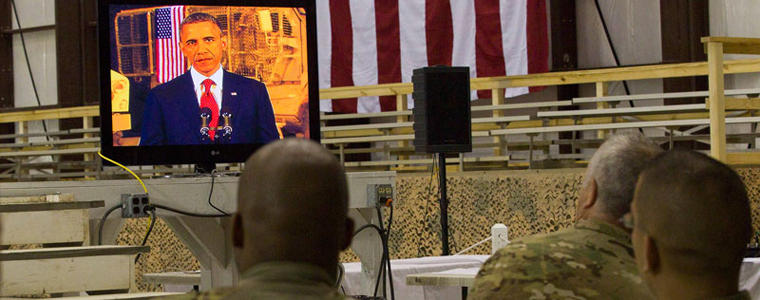A suicide blast rocked the capital of Afghanistan just hours after President Obama’s late night visit to the country. USIP reports from Kabul on the president’s visit, the suicide attack and the road ahead.

KABUL - President Obama's late-night visit to Kabul and his remarks on the strategic partnership agreement were largely upstaged here by an attack on a contractor compound on the city's east side. The coordinated attack reportedly killed seven people and injured many more. It closed down Jalalabad Road, a major artery, further clogging Kabul's notoriously crowded streets and thus dominated local news coverage.
The attack still didn't take away from the substance of Obama's remarks. Obama laid out a long-term relationship with Afghanistan, made clear his intention not to maintain any American military bases here after 2014 and committed to a peace and reconciliation process.
"In coordination with the Afghan government, my administration has been in direct discussions with the Taliban," Obama said during remarks at Bagram Air Base. "We have made it clear that they can be part of this future if they break with al-Qaida, renounce violence and abide by Afghan laws," he said.
"It was positive that Obama made clear that for those who want peace and engage in a peace process, there is a path for them to proceed down," said USIP's Andrew Wilder, who is travelling in Afghanistan this week. Negotiating a peace agreement with the Taliban that encourages at least some to enter into mainstream Afghan politics will be difficult and may not succeed, said Wilder.
"But it's worth making every effort to try," he said.
The focus of most U.S. policymakers has been on the security transition in Afghanistan, giving the equally important political and economic transitions Afghanistan faces short shrift, he said.
"Speaking forcefully about reconciliation was a positive dimension of his remarks, but the U.S. must also begin to communicate equally forcefully about the need for a peaceful and democratic transition of political power in 2014," he said.
Karzai is prohibited by the Constitution from seeking a third term but in the distrustful atmosphere that is Afghanistan, some Afghans fear the president may attempt to stay on.
"One of the most positive surprises about the strategic partnership agreement was how clear and strong it was on highlighting the importance of protecting and promoting democratic values, including the central importance of ‘free, fair and transparent' presidential elections in 2014," Wilder said.
Afghanistan needs credible and viable political institutions to succeed, said Scott Smith, a former U.N. official in Afghanistan who recently joined USIP as a deputy director of the Afghanistan program. "The successful political transition underpins the sustainability of the gains made by the security transition," said Smith, who is also traveling in Afghanistan this week. "A legitimate government is a force multiplier."
Obama's remarks, delivered in the early evening hours on the East Coast of the U.S. but so late that most Afghans would not have seen them, points up the need to articulate a clear message to Afghans about American policy in the next several years.
"Since Obama's remarks weren't seen by most of the Afghan public because his visit was in the middle of the night here, there is an urgent need to follow his speech up with a clear strategy to communicate to Afghans that the U.S. is not rushing to the exits in Afghanistan, and is firmly committed to doing all it can to supporting responsible security transition as well as a democratic political transition in 2014."
Just as important, however, is the need for President Karzai to find a way to communicate more consistently and effectively that this agreement is something that he believes in, and that its successful implementation will be of critical importance to future peace and stability in Afghanistan," Wilder said.



